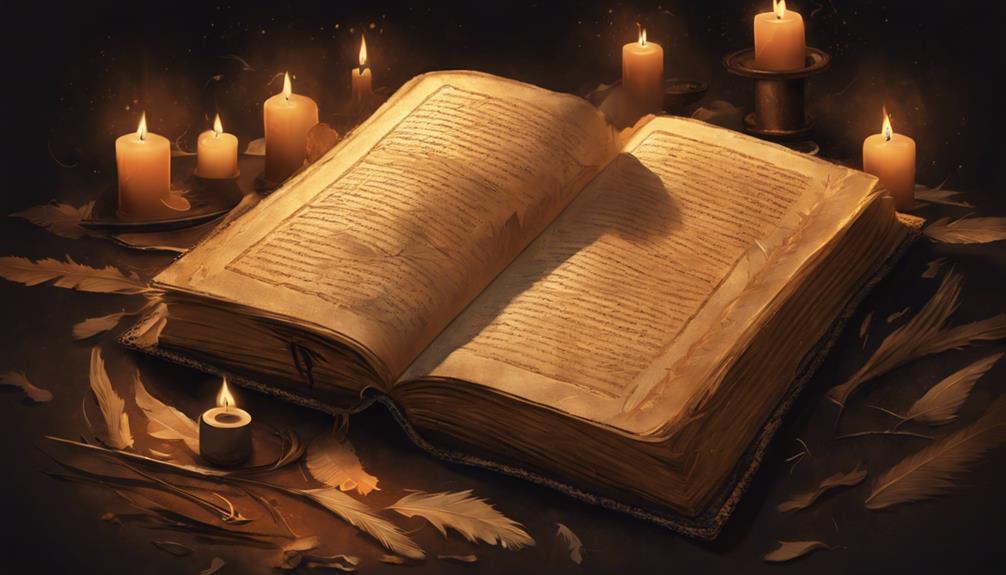As you venture into the intricately woven verses of 'Mezzo Cammin,' you're confronted with a poignant reflection of the human experience. The poet's midlife crisis unfolds with unflinching honesty, laying bare existential dread, nostalgia, and the search for meaning that often accompany the passage of time. Longfellow's inner turmoil is exposed, as creative blockage, self-doubt, and anxiety blur the lines between existence and essence. The poem's autobiographical elements, rich imagery, and symbolism weave a tapestry of introspection, nostalgia, and the struggle to find purpose. And as you continue, the layers of this masterpiece will slowly reveal themselves, revealing the profound exploration of the human condition.
The Poet's Midlife Crisis Unfolds

As you explore the poem, it becomes apparent that the speaker's introspection is triggered by a midlife crisis, where the poet's inner turmoil unfolds like a tapestry, woven from threads of regret, longing, and introspection. This midlife introspection is a pivotal moment, where the speaker's existential dread begins to surface. You can sense the poet's anxiety as they grapple with the passing of time, and the fear of unfulfilled potential.
The poet's midlife crisis is characterized by a deep-seated regret, stemming from the realization that half of life has been lived, with little to show for it. This existential dread permeates the poem, as the speaker struggles to reconcile their past, present, and future. The poet's introspection is a desperate attempt to make sense of their life, and find meaning in the fleeting nature of existence. As you investigate further into the poem, it becomes clear that the speaker's midlife crisis is not just a personal struggle, but a universal human experience.
Imagery and Symbolism in Mezzo Cammin
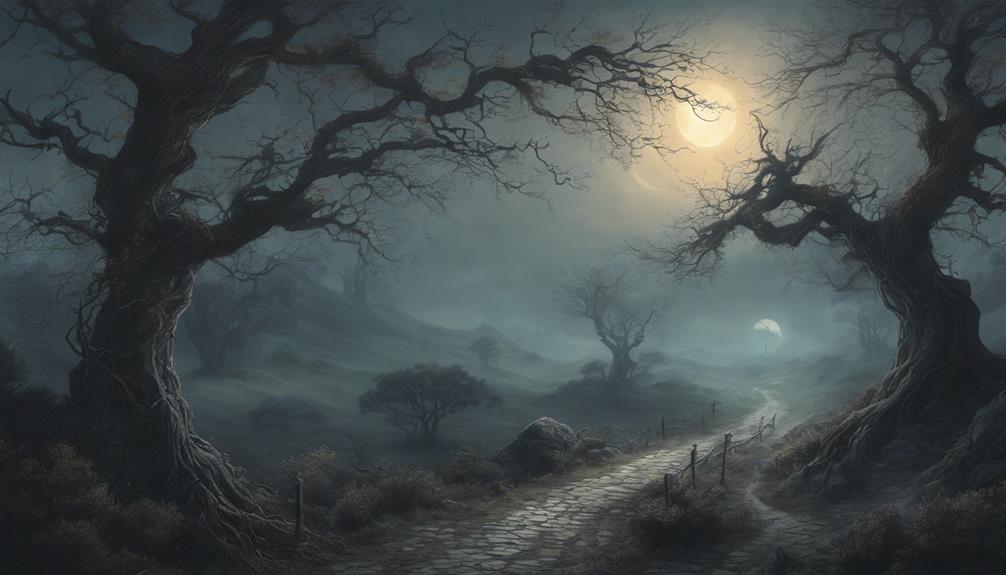
The rich tapestry of Mezzo Cammin is woven with intricate imagery and symbolism, inviting you to explore the poet's introspective narrative, where the speaker's emotional landscape is mirrored in the vivid descriptions of nature. As you immerse yourself in the poem, you're engulfed in a sensory exploration of the natural world, where the poet's inner turmoil is reflected in the turbulent landscapes. The use of vivid imagery creates a sense of intimacy, drawing you into the speaker's inner world, where the boundaries between self and nature blur. The poet's masterful use of symbolism transforms the natural world into a mirror of the speaker's psyche, where the turmoil of the inner world is reflected in the turbulent landscapes. The vivid descriptions of nature serve as a metaphor for the speaker's emotional state, inviting you to investigate the intricate web of emotions that underlies the poem.
Nostalgia and the Fleeting Nature

In the domain of Mezzo Cammin, nostalgia whispers secrets to the fleeting nature of time, beckoning you to face the impermanence of life's precious moments. As you explore the poem, you're struck by the bittersweet quality of nostalgic longing. The poet masterfully intertwines fleeting memories, evoking a sense of wistfulness that permeates every line.
You begin to realize that nostalgia isn't simply a sentimental longing for the past, but a profound acknowledgment of time's relentless passage. The poet's use of imagery and symbolism underscores the ephemeral nature of human experience, where moments are lost forever in the currents of time. The nostalgic tone serves as a poignant reminder that our most cherished memories are, in fact, fleeting.
As you navigate the poem's intricate landscape, you're compelled to confront the uncomfortable truth: that our lives are but a brief, shining moment in the grand tapestry of time. And it's precisely this confrontation that imbues Mezzo Cammin with its haunting beauty, inviting you to cherish the present and honor the memories that make us human.
The Search for Meaning in Life

You're left pondering the impermanence of life's precious moments, and this introspection naturally gives rise to a profound question: what constitutes a life of purpose and meaning? As you explore further into this inquiry, existential dread begins to creep in, casting a shadow of uncertainty over your existence. The search for meaning becomes an all-consuming quest, driving you to confront the abyss of uncertainty. In this existential crisis, you're forced to reevaluate your priorities, values, and beliefs. The poem's introspective tone invites you to participate in this self-reflection, prompting you to question the nature of your own existence. Amidst the turmoil, a glimmer of hope emerges: the potential for spiritual awakening. As you navigate the labyrinth of your own consciousness, you're compelled to seek answers, to find solace in the midst of uncertainty. The search for meaning becomes a journey of self-discovery, where the boundaries between existence and essence begin to blur.
Longfellow's Inner Turmoil Exposed
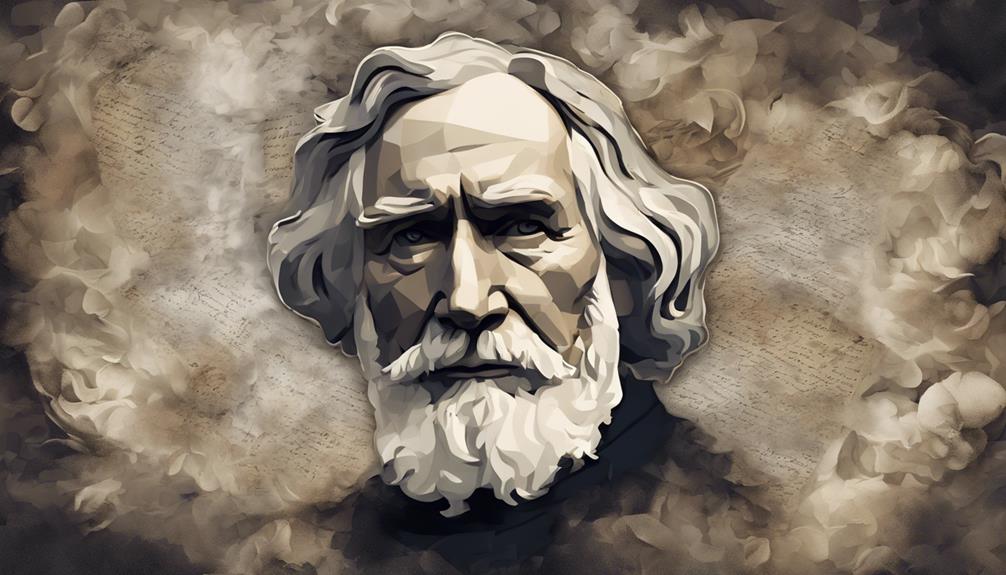
Several critics have argued that Longfellow's poem, 'Mezzo Cammin,' is a deeply personal and introspective work, with the poet's inner turmoil and existential crises laid bare for all to see. As you explore the poem, you'll find that Longfellow's inner demons are expertly woven throughout the narrative. His struggle to reconcile his artistic ambitions with the harsh realities of life is palpable, and it's clear that he's grappling with a creative blockage that's stifling his muse. The poem becomes a confessional, where Longfellow's fears, doubts, and anxieties are laid bare. You can sense the weight of his inner turmoil, as he wrestles to find meaning in a seemingly meaningless world. The poet's introspection is unflinching, and his willingness to confront his inner demons head-on is a proof to his bravery as a writer. As you read 'Mezzo Cammin,' you'll find yourself drawn into Longfellow's inner world, where the lines between creativity and despair blur.
Themes of Mortality and Regret
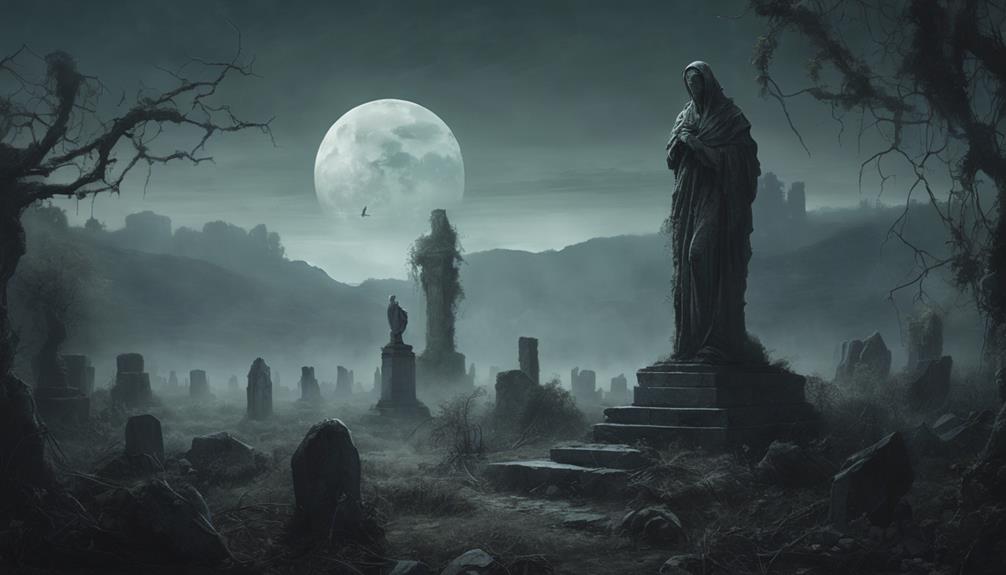
As you immerse yourself in the poet's inner world, you'll begin to notice that the undertones of mortality and regret permeate every stanza, echoing the existential crises that Longfellow laid bare in the previous lines. The poem's introspective tone is characterized by a profound awareness of life's fleeting nature, prompting the poet to reflect on the impermanence of human existence. You'll observe how Longfellow's words convey a deep sense of regret, stemming from the realization that life's legacy is often defined by the choices we make in our youth. The poet's introspection serves as a poignant reminder that our actions have consequences, and that the passage of time is unforgiving. The fleeting nature of youth, in particular, is a recurring motif, as Longfellow laments the loss of innocence and the inevitability of decline. Through this introspective exploration, Longfellow masterfully conveys the human experience, underscoring the importance of living a life that leaves a lasting legacy.
The Poem's Autobiographical Elements

In its nuanced exploration of the human experience, Mezzo Cammin seamlessly weaves together threads of Longfellow's personal life, rendering the poem an intimate, autobiographical portrait of the poet's introspective journey. You'll notice how Longfellow draws from his childhood reflections, recalling memories of his family's dynamics and the emotional landscape of his youth. The poem's autobiographical elements are expertly woven throughout the narrative, allowing you to glimpse the poet's inner world. For instance, the poem's focus on family dynamics echoes Longfellow's own experiences as a member of a prominent Boston family. You can almost sense the poet's introspective gaze as he reflects on his relationships, particularly with his father, Stephen Longfellow. By incorporating these autobiographical elements, Longfellow creates a sense of vulnerability, allowing you to connect with the poet on a deeper level. As you explore further into the poem, you'll uncover more of these autobiographical threads, which add layers of complexity to the poet's introspective exploration of the human experience.
The Struggle to Find Purpose

During the poet's introspective journey, you'll perceive a pervasive struggle to find purpose, as Longfellow grapples with the tension between his creative ambitions and the expectations of his family's legacy. This internal conflict gives rise to a crippling sense of purpose paralysis, where the weight of responsibility and expectation threatens to suffocate his artistic voice.
As you explore further into the poem, you'll observe how Longfellow's existential dread permeates every line, a constant reminder that time is fleeting and mortality looms. This dread fuels his sense of urgency, as he wrestles to reconcile his desire for creative expression with the burdens of his family's legacy. The poet's introspection reveals a deeper anxiety, one that stems from the fear of not fulfilling his artistic potential.
Through Longfellow's struggle, you'll come to realize that finding purpose is a perpetual challenge, one that requires constant self-reflection and artistic expression. As you navigate the poet's inner turmoil, you'll uncover a profound exploration of the human condition, where the quest for purpose is both a driving force and a crippling burden.
Time's Relentless Passage Explored

One half of life's journey is already traversed, you find, when the poet confronts the inexorable passage of time, which relentlessly ticks away, undermining his sense of accomplishment and fueling his angst about unfulfilled aspirations. This realization sparks a profound introspection, as the poet grapples with the cruel irony that time's silence belies its swift erosion of his youth and energy. The ticking clock echoes through his mind, a constant reminder of opportunities lost and dreams deferred. As the hours slip away, the poet's anxiety intensifies, prompting him to reevaluate his priorities and confront the fear of unfulfilled potential. Time's relentless passage serves as a stark reminder that the poet's window of opportunity is rapidly narrowing, and the weight of this awareness threatens to crush his spirit.
Universality of Middle Age Angst
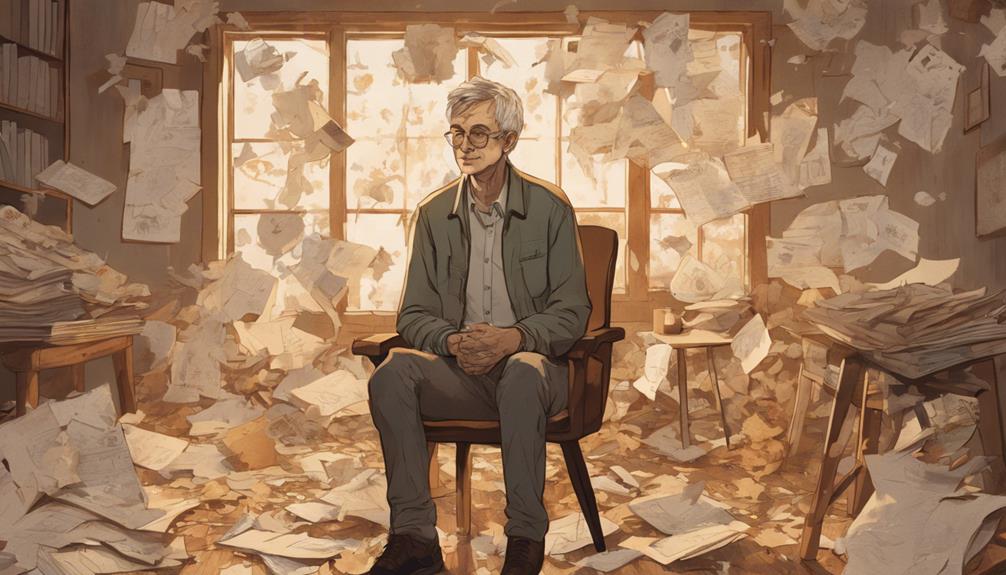
As you navigate the midlife passage, you're likely to find that the angst you're experiencing is far from unique, for it's a ubiquitous phenomenon that has beset countless individuals who've reached this critical juncture. Middle age disillusionment, characterized by a growing sense of discontent and frustration, is a pervasive sentiment that transcends cultural and socioeconomic boundaries. It's a universal experience that strikes at the very core of one's being, evoking feelings of existential dread and uncertainty.
You're not alone in grappling with the challenging realization that your youthful aspirations and ideals have given way to the harsh realities of adulthood. The angst you're experiencing is a natural byproduct of reconciling the disparity between your expectations and the actuality of your life. It's a crisis of identity, precipitated by the creeping awareness that time is running out, and the choices you've made thus far may not have been the most effective. As you confront the abyss of uncertainty, it's crucial to acknowledge that you're part of a larger collective, united by the shared experience of middle age angst.
Frequently Asked Questions
What Inspired Henry Wadsworth Longfellow to Write Mezzo Cammin?
As you explore the creative process of Henry Wadsworth Longfellow, you'll find that his poem 'Mezzo Cammin' was inspired by biographical influences. His 50th birthday sparked introspection, prompting a creative expression of self-reflection. Longfellow's personal struggles, including the loss of his wife and struggles with depression, influenced his writing. This poem, then, is a candid reflection of his midlife crisis, where he grapples with mortality, faith, and the human condition.
Is Mezzo Cammin a Reflection of Longfellow's Personal Life Experiences?
As you explore Longfellow's poem, you'll find that Mezzo Cammin is, indeed, a reflection of his personal life experiences. The poem serves as a poetic confession, where Longfellow introspects on his life's journey, grappling with feelings of disillusionment and uncertainty. Through his verse, you'll sense the echoes of his own struggles, as he navigates the complexities of middle age, rendering Mezzo Cammin a deeply personal and relatable work.
What Is the Significance of the Poem's Title, Mezzo Cammin?
'When in Rome, do as the Romans do' – and in this case, understanding the Italian roots of 'Mezzo Cammin' is essential. You'll find that the title, which translates to 'halfway' in English, holds significant weight. It's a nod to the poet's introspection, symbolizing the midpoint of life's journey. By using this title, the poet invites you to reflect on your own path, prompting a deeper examination of personal growth and self-awareness.
How Does Mezzo Cammin Relate to Modern Midlife Crises?
As you navigate the complexities of modern life, you'll likely encounter a midlife crisis, plagued by regrets and existential dread. This phenomenon is reminiscent of the medieval concept of "mezzo cammin," or middle of the journey. Just as medieval travelers reassessed their paths at mid-journey, modern individuals experience a similar introspection, confronting the disparity between their youthful aspirations and current realities, leading to a crisis of identity and purpose.
What Message Does Longfellow Convey Through Mezzo Cammin's Themes?
As you explore the themes of Mezzo Cammin, you'll find that Longfellow conveys a profound message about life's journey. Through the poem, he emphasizes the importance of self-reflection, urging you to pause and assess your progress midway through life. By doing so, Longfellow suggests that introspection is vital to maneuvering life's complexities, allowing you to re-evaluate priorities and make meaningful adjustments to guarantee a more fulfilling existence.
